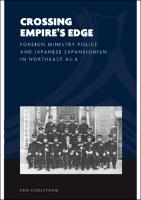Crossing Empire’s Edge
Foreign Ministry Police and Japanese Expansionism in Northeast Asia
| dc.contributor.author | Esselstrom, Erik | |
| dc.date.accessioned | 2020-12-15T14:08:00Z | |
| dc.date.available | 2020-12-15T14:08:00Z | |
| dc.date.issued | 2020 | |
| dc.identifier | OCN: 1229512751 | |
| dc.identifier.uri | https://library.oapen.org/handle/20.500.12657/43905 | |
| dc.description.abstract | For more than half a century, the Japanese Ministry of Foreign Affairs (Gaimusho) possessed an independent police force that operated within the space of Japan’s informal empire on the Asian continent. Charged with "protecting and controlling" local Japanese communities first in Korea and later in China, these consular police played a critical role in facilitating Japanese imperial expansion during the late nineteenth and twentieth centuries. Remarkably, however, this police force remains largely unknown. Crossing Empire’s Edge is the first book in English to reveal its complex history. Based on extensive analysis of both archival and recently published Japanese sources, Erik Esselstrom describes how the Gaimusho police became deeply involved in the surveillance and suppression of the Korean independence movement in exile throughout Chinese treaty ports and the Manchurian frontier during the 1920s and 1930s. It had in fact evolved over the years from a relatively benign public security organization into a full-fledged political intelligence apparatus devoted to apprehending purveyors of "dangerous thought" throughout the empire. Furthermore, the history of consular police operations indicates that ideological crime was a borderless security problem; Gaimusho police worked closely with colonial and metropolitan Japanese police forces to target Chinese, Korean, and Japanese suspects alike from Shanghai to Seoul to Tokyo. Esselstrom thus offers a nuanced interpretation of Japanese expansionism by highlighting the transnational links between consular, colonial, and metropolitan policing of subversive political movements during the prewar and wartime eras. In addition, by illuminating the fervor with which consular police often pressed for unilateral solutions to Japan’s political security crises on the continent, he challenges orthodox understandings of the relationship between civil and military institutions within the imperial Japanese state. While historians often still depict the Gaimusho as an inhibitor of unilateral military expansionism during the first half of the twentieth century, Esselstrom’s exposé on the activities and ideology of the consular police dramatically challenges this narrative. Revealing a far greater complexity of motivation behind the Japanese colonial mission, Crossing Empire’s Edge boldly illustrates how the imperial Japanese state viewed political security at home as inextricably connected to political security abroad from as early as 1919—nearly a decade before overt military aggression began—and approaches northeast Asia as a region of intricate and dynamic social, economic, and political forces. In doing so, Crossing Empire’s Edge inspires new ways of thinking about both modern Japanese history and the modern history of Japan in East Asia. | |
| dc.language | English | |
| dc.subject.classification | thema EDItEUR::N History and Archaeology::NH History::NHF Asian history | en_US |
| dc.subject.other | History | |
| dc.subject.other | Asia | |
| dc.subject.other | Japan | |
| dc.title | Crossing Empire’s Edge | |
| dc.title.alternative | Foreign Ministry Police and Japanese Expansionism in Northeast Asia | |
| dc.type | book | |
| oapen.relation.isPublishedBy | 045e1fd0-73d7-4136-9779-99fce14e969b | |
| oapen.relation.isFundedBy | b818ba9d-2dd9-4fd7-a364-7f305aef7ee9 | |
| oapen.relation.isbn | 9780824887643 | |
| oapen.collection | Knowledge Unlatched (KU) | |
| oapen.imprint | University of Hawai‘i Press | |
| oapen.identifier | https://openresearchlibrary.org/viewer/64b96707-c399-42b4-9713-3459e7e5f979 | |
| oapen.identifier.isbn | 9780824887643 | |
| grantor.number | 104654 |

